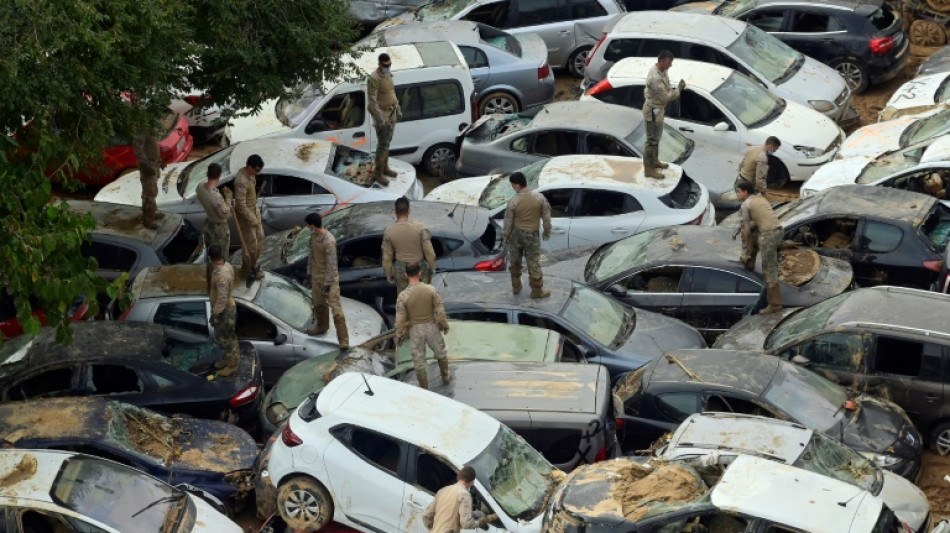
-
 Spanish skater allowed to use Minions music at Olympics
Spanish skater allowed to use Minions music at Olympics
-
Fire 'under control' at bazaar in western Tehran

-
 Howe trusts Tonali will not follow Isak lead out of Newcastle
Howe trusts Tonali will not follow Isak lead out of Newcastle
-
Vonn to provide injury update as Milan-Cortina Olympics near

-
 France summons Musk for 'voluntary interview', raids X offices
France summons Musk for 'voluntary interview', raids X offices
-
Stocks mostly climb as gold recovers

-
 US judge to hear request for 'immediate takedown' of Epstein files
US judge to hear request for 'immediate takedown' of Epstein files
-
Russia resumes large-scale strikes on Ukraine in glacial temperatures

-
 Fit-again France captain Dupont partners Jalibert against Ireland
Fit-again France captain Dupont partners Jalibert against Ireland
-
French summons Musk for 'voluntary interview' as authorities raid X offices

-
 IOC chief Coventry calls for focus on sport, not politics
IOC chief Coventry calls for focus on sport, not politics
-
McNeil's partner hits out at 'brutal' football industry after Palace move collapses

-
 Proud moment as Prendergast brothers picked to start for Ireland
Proud moment as Prendergast brothers picked to start for Ireland
-
Germany has highest share of older workers in EU

-
 Teen swims four hours to save family lost at sea off Australia
Teen swims four hours to save family lost at sea off Australia
-
Ethiopia denies Trump claim mega-dam was financed by US

-
 Norway crown princess's son pleads not guilty to rapes as trial opens
Norway crown princess's son pleads not guilty to rapes as trial opens
-
Russia resumes strikes on freezing Ukrainian capital ahead of talks

-
 Malaysian court acquits French man on drug charges
Malaysian court acquits French man on drug charges
-
Switch 2 sales boost Nintendo profits, but chip shortage looms

-
 China to ban hidden car door handles, setting new safety standards
China to ban hidden car door handles, setting new safety standards
-
Switch 2 sales boost Nintendo results but chip shortage looms

-
 From rations to G20's doorstep: Poland savours economic 'miracle'
From rations to G20's doorstep: Poland savours economic 'miracle'
-
Russia resumes strikes on freezing Ukrainian capital

-
 'Way too far': Latino Trump voters shocked by Minneapolis crackdown
'Way too far': Latino Trump voters shocked by Minneapolis crackdown
-
England and Brook seek redemption at T20 World Cup

-
 Coach Gambhir under pressure as India aim for back-to-back T20 triumphs
Coach Gambhir under pressure as India aim for back-to-back T20 triumphs
-
'Helmets off': NFL stars open up as Super Bowl circus begins

-
 Japan coach Jones says 'fair' World Cup schedule helps small teams
Japan coach Jones says 'fair' World Cup schedule helps small teams
-
Equities and precious metals rebound after Asia-wide rout

-
 Do not write Ireland off as a rugby force, says ex-prop Ross
Do not write Ireland off as a rugby force, says ex-prop Ross
-
Winter Olympics 2026: AFP guide to Alpine Skiing races

-
 Winter Olympics to showcase Italian venues and global tensions
Winter Olympics to showcase Italian venues and global tensions
-
Buoyant England eager to end Franco-Irish grip on Six Nations

-
 China to ban hidden car door handles in industry shift
China to ban hidden car door handles in industry shift
-
Sengun leads Rockets past Pacers, Ball leads Hornets fightback

-
 Waymo raises $16 bn to fuel global robotaxi expansion
Waymo raises $16 bn to fuel global robotaxi expansion
-
Netflix to livestream BTS comeback concert in K-pop mega event

-
 Rural India powers global AI models
Rural India powers global AI models
-
US House to vote Tuesday to end shutdown

-
 Equities, metals, oil rebound after Asia-wide rout
Equities, metals, oil rebound after Asia-wide rout
-
Bencic, Svitolina make history as mothers inside tennis top 10

-
 Italy's spread-out Olympics face transport challenge
Italy's spread-out Olympics face transport challenge
-
Son of Norway crown princess stands trial for multiple rapes

-
 Side hustle: Part-time refs take charge of Super Bowl
Side hustle: Part-time refs take charge of Super Bowl
-
Paying for a selfie: Rome starts charging for Trevi Fountain

-
 Faced with Trump, Pope Leo opts for indirect diplomacy
Faced with Trump, Pope Leo opts for indirect diplomacy
-
NFL chief expects Bad Bunny to unite Super Bowl audience

-
 Australia's Hazlewood to miss start of T20 World Cup
Australia's Hazlewood to miss start of T20 World Cup
-
Bill, Hillary Clinton to testify in US House Epstein probe


Global warming is a security threat and armies must adapt: experts
From responding to weather disasters to rising competition in the fast-warming Arctic, militaries are exposed to climate change and cannot let it become a strategic "blind spot", security experts say.
Concerns have grown recently that climate action is being sidelined as Europe beefs up defence and the US retreats from allies and its green commitments.
But defence departments have already underscored that a warming planet poses major national security challenges, and militaries need to adapt to respond to these evolving threats.
"You can't escape this. Climate doesn't care who's president or what your political goals are at the moment," said Erin Sikorsky, director of the Washington-based Center for Climate & Security.
"It is coming, and militaries need to be prepared," she said.
In the US, where President Donald Trump's administration has scrubbed global warming from government websites, the latest intelligence threat assessment made no mention of climate change.
Sikorsky said this leaves crucial strategic gaps, particularly when it comes to renewable energy superpower China and the race for supremacy in the Arctic, where the loss of sea ice is opening up shipping lanes and access to resources.
"What I worry about, as someone who worked in national security for a long time, is this blind spot puts the US at risk," she said.
In Europe, Russia's invasion of Ukraine sparked energy security fears and accelerated many countries' renewables ambitions.
But in recent months countries have slashed international development aid, throwing climate budgets into question as spending priorities turn to defence and trade.
German Foreign Minister Annalena Baerbock last month acknowledged the "extremely challenging" geopolitical situation but insisted that climate action remained a "top security policy".
The country plans a half trillion dollar spending "bazooka" for military and infrastructure, coupled with 100 billion euros for climate measures.
-'Weaponising' disaster -
"Anyone thinking about security needs to think about climate as well. We are already living in the climate crisis," said an assessment commissioned by Germany's foreign and defence ministries in February.
It said climate challenges were emerging over "the entire range of military tasks", with increased risks including large-scale crop failures, conflict and instability.
In a September report, the UK's Ministry of Defense said humanity's impact on climate and the environment "continues to have far-reaching consequences, putting significant pressure on societies and economies and threatening the very existence of some states".
Militaries are increasingly being called in following floods, storms and wildfires, stretching the capacity of some forces, said Sikorsky, whose organisation has tracked more than 500 such emergency responses across the world since 2022.
There have also been efforts to "weaponise" climate disasters, she said.
Last year, torrential rains unleashed by Storm Boris caused massive flooding in Poland that swept away bridges, and destroyed homes and schools.
But as soldiers helped evacuate residents and clear debris, the government said it faced a 300 percent increase in Russian online disinformation, targeting the relief effort.
Sikorsky said China used the same "playbook" in the aftermath of deadly floods in Valencia, Spain, which also saw thousands of soldiers deployed.
Warming itself also has major operational implications.
Extreme temperatures can risk the health of soldiers and even reduce the amount of cargo that planes can carry, said Sikorsky.
- Energy vulnerabilities -
Militaries are not required to report their greenhouse gas emissions, so their direct contribution to global warming is not precisely known.
But a 2024 report by the European Union estimated the carbon "bootprint" of the world's armies could be 5.5 percent of global emissions.
The Pentagon alone produced more emissions than nations like Portugal or Denmark, the "Greening the Armies" report said.
Armies worried about fossil fuel dependence long before climate change became a priority -- concerns go back to the oil crisis in the 1970s, said Duncan Depledge from Loughborough University, who studies the implications of climate for militaries.
According to a 2019 study, the US army consumed about a gallon of fuel per soldier per day in World War Two. During the 1990-91 Gulf War it was around four gallons, and by 2006 it had surged to some 16 gallons in US operations in Iraq and Afghanistan.
A heavy reliance on fossil fuels creates "significant vulnerabilities" in combat, said the EU report.
Fuel convoys are an easy target for roadside bombs, which accounted for nearly half of American deaths in Iraq and close to 40 percent in Afghanistan, it said.
Renewable energy could help avoid these risks, the report said, but acknowledged the technology was "not yet entirely suitable for combat".
Depledge said a faster global energy transition to avert "climate catastrophe" would pose challenges for armies, likely raising concerns over their fossil fuel use.
"Whichever direction you go, militaries no longer have a choice about the fact that they're going to be operating in a very different world to what they do today," he said.
J.Bergmann--BTB




